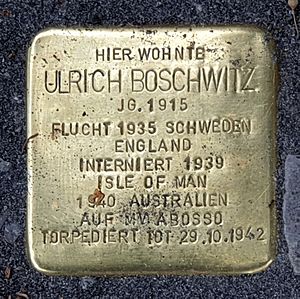Ulrich Alexander Boschwitz facts for kids
Ulrich Alexander Boschwitz (born April 19, 1915, in Berlin, Germany – died October 29, 1942, in the North Atlantic Ocean) was a German writer. He also used the pen name John Grane.
Contents
Early Life and Family
Ulrich Boschwitz was born in Berlin. His father, Salomon Boschwitz, owned a factory. His mother, Martha, came from an important family in Lübeck and studied painting. Ulrich's father served in World War I but sadly passed away in 1915, just after Ulrich was born. This meant Ulrich's mother had to raise him and his older sister, Clarissa, by herself and manage the family business.
Leaving Germany
In 1935, a sad event happened: Ulrich's uncle, Alexander Wolgast, was killed. He had spoken out against the unfair laws that targeted Jewish people in Germany. Around the same time, Ulrich was told he had to join the German army.
Because of these dangers, Ulrich and his mother quickly left Germany. They went to Norway. His sister, Clarissa, had already moved to Palestine in 1933, where she lived for the rest of her life.
Life as a Refugee and Writer
While in Norway, Ulrich wrote his first book, Menschen neben dem Leben. This title means ‘People Alongside Life’. It was first printed in Swedish in 1937, using his pen name, John Grane.
From Norway, Ulrich and his mother traveled to many countries. They lived in Luxembourg, France, and Belgium before finally reaching Britain in 1939. During his travels, he wrote another important book called Der Reisende. This book was written after a terrible event in Germany called Kristallnacht, which was a violent attack against Jewish people.
Der Reisende was published in English with different titles: The Man Who Took Trains in the United States and The Fugitive in the United Kingdom. When it first came out, the book did not become famous and soon went out of print. However, many years later, in the 2010s, the book was found again. It was re-released as "The Passenger". This new edition became a huge success! It was translated into over 20 languages and even made it onto The Sunday Times best-seller list, more than 80 years after it was first written.
Imprisonment and Final Journey
When World War II started, Ulrich and his mother were arrested in Britain. They were seen as "enemy aliens" because they were German. They were sent to a camp on the Isle of Man. In 1940, Ulrich was sent even further away, to Australia, where he was held in another camp.
During his trip to Australia, on a ship called the HMT Dunera, something terrible happened. A crew member threw the only copy of Ulrich's new book, Das Grosse Fressen (which means ‘The Big Feast’), into the ocean.
While in Australia, Ulrich worked on making changes to Der Reisende. He also started writing a new book called Traumtage (‘Dream Days’). In 1942, he was finally set free and allowed to go back to Britain.
Tragic End
On October 29, 1942, Ulrich Boschwitz was on a ship called the MV Abosso, heading back to Britain. Sadly, a German submarine attacked and sank the ship. Ulrich, who was only 27 years old, was one of 362 people who died. His last writings were lost with him.
His Books and Legacy
After his book Der Reisende was re-published in 2021, many people began to praise Ulrich Boschwitz's writing. Some have even compared him to famous authors like Franz Kafka and Thomas Mann.
His first book, Menschen neben dem Leben, tells stories about people living through tough times in Germany after World War I. This book was first published in Swedish in 1937.
His second book, Der Reisende, takes place in Nazi Germany in November 1938, right after the Kristallnacht attacks. In 2021, a new English version of this book was released. It was called The Passenger and was based on Ulrich's original German notes.
It is interesting to know that neither of his books was published in their original German language until much later: Der Reisende in 2018 and Menschen neben dem Leben in 2019.


